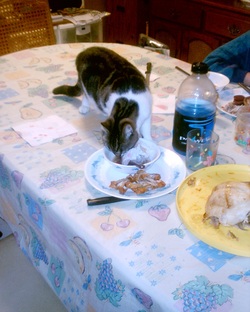|
Nails should be clipped about once a month. Make sure you have good, sharp nail clippers and Quik Stop powder in the event that you get a quick. Should you feed your cat soup when its stomach is upset? Well, no, not exactly. But, just like we need a bland diet of soup and crackers, pets need bland diets when their stomach's are upset. And, "no", that dry kibble you give you dog and cat is NOT bland. It may look that way, but it is not the soup and crackers of the pet world.
These are the instructions that I give to my Veterinary clients for a bland diet when their pet is vomiting or having diarrhea. Please remember to always check with your Veterinarian, as different recommendations are made depending on what we see on physical exam. Most notably, when a pet has Pancreatitis, we pull them off of food for a few days and put them on IV fluids. Bland Diet: 1) If vomiting, pull them off of food and water for a time determined by your Veterinarian (12-24 hours is typical). 2) In cases of diarrhea, we will sometimes pull them off of all food and water for a period of time. Other times, we just start on the bland diet. 3) For the next 3 days (or until the diarrhea is resolved), do not give any regular food or treats. Just give the bland diet. 4) Vomiting should resolve quickly. If it does not, contact your Veterinarian again. 5) DOGS should be given a 50:50 mixture of a carbohydrate and a protein. Carbs: sweet potato, rice, or pasta NO SAUCE!! Protein: boiled chicken, boiled beef, or cottage cheese 6) CATS should be given human baby food (beef, chicken, etc). I have found that Prairie brand canned chicken only food mixed with Gerber baby rice works like a charm for diarrhea, and they love it. 7) After the 3 (or more) days of just bland diet, slowly start to reintroduce their regular food. Take 3 days to switch back to the regular diet. Each meal, decrease the bland diet, and increase the regular food. Your Veterinarian may recommend probiotics, such as pro-pectalin, or Forti-Flora; and antibioitcs to help with the bacterial overgrowth that pet get when they get diarrhea. Remember, Our House Call Vet can always get the medication compounded into a flavored liquid, especially for those finicky cats. If your pet is continuing to have symptoms, diagnositc (x-ray, ultrasound, bloodwork, etc) may need to be done; as well as admitting the pet to the hospital for IV fluids. Our House Call Vet hopes that your pet is feeling better soon!!! |
AuthorDr. Cynthia Mazzola Categories
All
|

 RSS Feed
RSS Feed